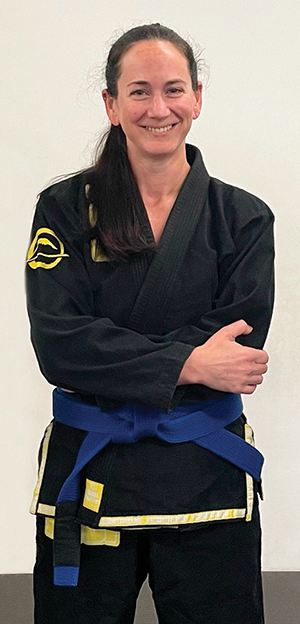 Lisa Dell’Alba is president and CEO of Square One Markets Inc., based in Bethlehem, Pennsylvania, and a member of the NACS executive committee.
Lisa Dell’Alba is president and CEO of Square One Markets Inc., based in Bethlehem, Pennsylvania, and a member of the NACS executive committee.
What are some of the challenges of being a small operator?
I think we are forced to creatively solve a lot of problems that are unique to the time we’re in. I just earned my blue belt in jujitsu, and I like to draw analogies to being a small operator. You have an opponent, right? And your opponent could be federal government regulations, for example. It could be the person across the street who might be a Wawa or Sheetz or someone who has it dialed in so well.
It’s your job to think about the angle you approach things with, and moving forward is one move but not always the right move. Sometimes when you look at the scenario, moving backwards makes more sense. In jujitsu, you have to think in 3D, and there are times on the mat when you realize moving forward is the worst place to put yourself in.
During COVID, a lot of places slowed down, but our industry sped up. For two years it was to stay open— that’s still very challenging. Some of my colleagues have had to close doors because they don’t have anyone to work. Is there another angle? Is there an opportunity to be nimble and move faster than your opponent when it comes to innovation or getting the store staffed in a creative way? In terms of innovation, I don’t know that it’s always this big thing. Sometimes it’s just solving problems on the fly and in a new way.
Handling product availability is one example. We’ve always said stay open, keep the store staffed, well-lit, friendly, clean and well-stocked. Well-stocked is an issue right now, so instead of that forward momentum of saying we need to keep the store stocked, maybe it’s, ‘let’s reduce the stock and create more space. Let’s create a new, more inviting environment that doesn’t feel so crowded.’ Or, ‘let’s highlight the things that our customers really want.’ I’ve noticed my competitors are doing that. In one store I just visited it was all foodservice, and the actual shelf space and the gondolas in the store set were very minimal.
Everyone in this industry says what you always did isn’t good enough anymore. You have to constantly reinvent yourself, and I think this period is showing us that that’s absolutely necessary, because if you want to be viable to your customers and continue to be convenient, the fast-forward button has been pressed.
One of the things that’s really important about NACS is you get to collaborate with people. When I’m in jujitsu class, my training partner is a black belt and my instructor is a 4th degree BJJ black belt, brown belt in judo and a karate master. You can literally stop in the middle of a roll and be like, ‘hey, I’m stuck. What advice do you have for me?’ And they’ll show you things that you don’t even realize—like you think you’re trapped and there’s no way you’re going to get out of this. And it’s like, ‘OK, bridge your hips up and move this way, and you’re like, ‘oh, I didn’t see that.’
It’s this big moving puzzle of problem solving, and if you train at the right place, the people around you are vested in your success. It’s not unlike NACS. It’s having people around you that help you solve problems.
As a small operator there are a lot of problems to solve right now, and sometimes you feel like you are being crushed by a 200-pound opponent, and you’re not. Sometimes it takes people on the outside to see what you don’t see and to give you the advice you need to move. You don’t have to be the biggest, strongest person in the room. It’s about using leverage, angles, space and the stronger parts of you against the weaker parts of your opponent.